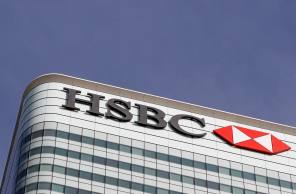

HSBC profits have shrunk by 62 per cent after the bank was hurt by a sequence of one-off charges.
According to a market update released today (21 February), the banking giant saw its pre-tax profits plunge to $7.1bn (£5.7bn) last year, down from the $18.9bn (£15.2bn) reported in 2015.
This drop was largely a result of one-off costs, such as charges related to the $3.2bn (£2.6bn) “impairment of goodwill” in Europe, and the completion of a $2.5bn (£2bn) share buy-back programme following the sale of its Brazil business
The bank was also hit by changes in credit spreads, with the bank suffering adverse fair value movements of $1.8bn (£1.5bn).
Stuart Gulliver, group chief executive at HSBC, said the uncertainties of last year’s “largely unexpected” political events contributed to volatile financial market conditions.
Yet he described HSBC's performance in 2016 as “broadly satisfactory”, pointing out the operating performance in the second half of the year was much stronger than expected.
Mr Gulliver also said the company had made better-than-anticipated progress in reducing the cost base, and delivering a total return to shareholders of 36 per cent.
The bank also revealed it was investing more than $2bn (£1.6bn) in digital features across its banking and wealth management businesses between 2015 and the end of 2020.
Last year, HSBC improved its internet and mobile banking platforms in several key markets, including the UK and Hong Kong.
It also launched so-called “innovation labs” which look at applying artificial intelligence, data management and improvements in cyber security to the business.
The firm is planning to launch a further $1bn (£800m) buy-back program which the HSBC boss said reflects the strength and flexibility of its balance sheet.
The bank also noted that current contingency plans suggest a need to move 1,000 jobs from London to Paris over the next two years, depending on unfolding Brexit negotiations.
The full year dividend ticked up slightly to $0.51.
Laith Khalaf, senior analyst at Hargreaves Lansdown, said HSBC’s share price has moved a long way in the last year, while the earnings of the company have actually taken a step back.
"The bank is a shining example of how the decline in sterling has bumped up the price of some of the UK’s largest companies, without much progress in underlying profits."
HSBC is the biggest single stock in the FTSE 100, and Mr Khalaf pointed out that millions of people across the UK will have a stake in the bank through their pension or their Isa.
"The reality is that for these investors the effect of currency translation is real and tangible.
"Weaker sterling has significantly lifted the value of their shareholding, and the dividends they receive in pounds and pence, and as we know it is best not to look a gift horse in the mouth."
Mr Khalaf added: "Despite an underwhelming set of full year results, HSBC is making progress in de-risking and restructuring, and ultimately the bank’s focus on the far east could be its trump card if the Chinese economy starts to fire on all cylinders."
katherine.denham@ft.com



